Rob Nunn's Blog: Interesting Though Elementary, page 9
September 25, 2022
Interesting Interview: Denny Dobry
Denny Dobry is known far and wide for his detailed recreation of 221b Baker Street that takes up his entire basement. I was lucky enough to get a detailed description of that process in The Finest Assorted Collection and he gives a rundown of specific pieces in each year's Baker Street Almanac.
But if you think Denny is just a guy who's built one cool thing, you don't know the half of it! First of all, Denny is one of the most down-to-earth and nice guys in this hobby. He ran The Beacon Society for years and has overseen an amazing Sherlockian book sale for even longer. While he hosts an official open house once a year, I can't count the number of Sherlockians who have told me about visiting Denny. The man seems to constantly be welcoming visitors! I could keep going on and on about Denny (I never even mentioned that one time he impersonated a drunken Mrs. Hudson), but let's get to the man himself, Denny Dobry!
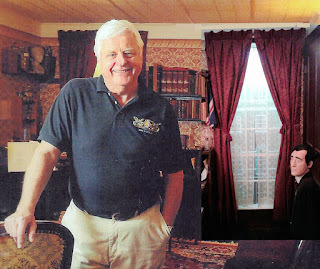
How do you define the word “Sherlockian”?
A Sherlockian is not merely someone who has read the Canon or collects books and other Sherlockiana. As I relate in the next question, to be a Sherlockian, something has to ‘click’ when you read the Canon. The root of this enchantment has been suggested to be the charm of the British Victorian era, the friendship between Holmes & Watson or the masterful story-telling of Doyle. Without experiencing one of these or a similar enchantment, readers would not return again and again to re-read the Canon. Sherlockians are not merely ‘readers’ of the Canon, but often find themselves as ‘eye-witnesses’ to the tales.
How did you become a Sherlockian?
I read SPEC in the ninth grade, and something ‘clicked’ for me, so I guess from that point on, I became a Sherlockian-in-waiting. However, in my youth, my interest focused on science, not literature. While most Sherlockians-to-be were reading the classics and mystery stories, I was reading Science Digest. I am probably the most ‘un-read’ Sherlockian ever to receive a Shilling. Despite brief emergences of Sherlockian interest inspired by my ninth-grade revelation, I didn’t drop my ‘-in-waiting’ status until all the publicity surrounding the 100th Anniversary of the publication of STUD hit the media. The year 1987 was the first time I became aware of the existence of the world of Sherlockiana. That initial ‘click’ back in the ninth grade grew into resounding roar, and from that point on, I considered myself to be a Sherlockian.
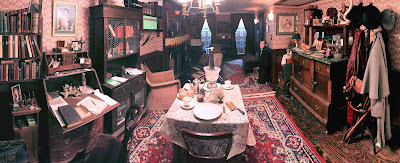
What was your profession before retiring and did that affect how you enjoyed being a Sherlockian?
I received my Bachelor’s Degree in Electrical Engineering from the University of Maryland. I took several post-graduate courses from Penn State University and the University of Wisconsin and changed my disciple to Civil Engineering. Eventually I became licensed as a Professional Engineer in four States. My studies and my career really had no positive affect on how I enjoy being a Sherlockian. The professional company that I kept were technically oriented and literature of any genre was never a topic of discussion. I recognize myself as an ‘irregularity’ among the Irregulars. Most Sherlockians are teachers, authors, lawyers, doctors, and other similar professions. As an engineer, I find myself as part of a very exclusive scion of Sherlockians.
What is your favorite canonical story?
I was totally drawn into the mystery in The Hound of the Baskervilles. I vividly remember the first time that I read it and was convinced that I had figured it out and that the Barrymores were culprits.
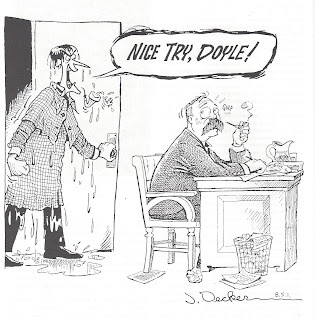
Who is a specific Sherlockian that you think others would find interesting?
Jeff Decker was the in-house cartoonist of the Baker Street Journal in the late 1980’s and early 1990’s. In addition, his work appeared in numerous other Sherlockian journals and publications. Although he no longer practices his art, his remarkable sense of humor and imagination is still enjoyed today, and a publication of his cartoons is currently in the works. Jeff and I are close friends and I thoroughly enjoy listening to him recount his personal experiences with Sherlockian legends as John Bennett Shaw, Tom Stix, Jr., and others.
What subset of Sherlockiana really interests you?
Many Sherlockians have heard of my 221b Baker Street sitting room re-creation. Gathering artifacts from the Canonical stories, therefore is my primary Sherlockiana subset interest. However, as often happens with collectors, I have gone off on a tangent and started to collect Hansom Cab miniatures. I currently have eleven (11) in my collection and have two more on my radar.
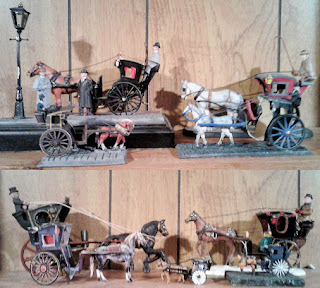
How did your 221B recreation come about and what is one item in your collection that sticks out to you?
In 1996, I attended my first scion meeting at Watson’s Tin Box in Baltimore Maryland. Before the meeting I was introduced to Paul Churchill and taken to his home. Paul had a created a 221b Baker Street sitting room, and that experience of being in the presence of actual artifacts from the Canon inspired me to start my own re-creation. Paul and I became very close friends and collaborated on many projects to promote our passion. We lost Paul in 2008, and our world lost a great Sherlockian. I have his photograph in my office and I think of him every day. I’m not sure what direction my Sherlockian life would have taken if I had never met Paul.
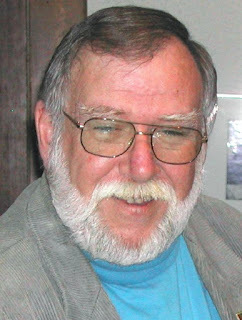
It is difficult to select just one item from the many favorites that I have. The one item that seems to be the favorite of visitors, however is Colonel Moran’s ‘air-gun’. In EMPT, Watson describes it as ‘a sort of gun, with a curiously misshapen butt,’ and of hearing ‘a long, whirling , grinding noise.’ From the photograph, the ‘curiously misshapen butt’ is obvious and the crank explains the ‘long, whirling , grinding noise’ as Moran turned the handle to pressurize the weapon. The inscription on the barrel reads: “JOH⋅PETERLONG INNSBRUCK”. Obviously implying that the gun was made in Austria by the blind German mechanic, Von Herder.
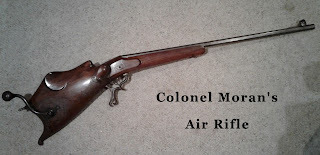
The BSI Book Sale and Open House is a Sherlockian book collector's dream. What drives you to keep such a large endeavor going?
I very much value preserving the history of the Baker Street Irregulars. When past-chair of the BSI Trust, Andy Solberg, asked me to sell non-archivable items donated to the Trust, for the benefit of the Trust, I was more than happy to oblige. Not only do I have the opportunity to add to the Trust’s finances, I’m able to keep valued Sherlockian scholarship titles in the hands of Sherlockians. And for my personal gratification, albeit for a short period of time, I’m often in possession of some very interesting and treasured Sherlockian objects. (A Shameless Promotion – If you have something that you would like to donate to the BSI Trust or would like a Sales List of available Sherlockiana, contact me at dendobry@ptd.net).
What book would you recommend to other Sherlockians?
The Canon: Baring-Gould’s and Klinger’s Annotated Sherlock Holmes. Both are essential Sherlockian Bibles.
Doyle Biography: Dan Stashower’s A Teller of Tales. The best, in my opinion, of all the ACD Biographies.
General Sherlockian/Doylean Facts: Mattias Bostrom’s From Holmes to Sherlock. This remarkable work gives the Holmes’ devotee anything and everything they could ever want to know about our passion.
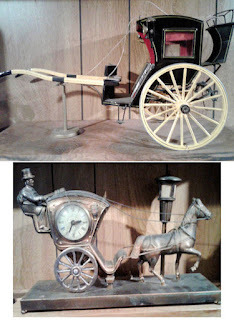
Where do you see Sherlockiana in 5 or 10 years from now?
I am hopeful and confident that the Sherlockian world will be alive and well in the future. There will be, as today, a mixture of purely traditional Sherlockians, Sherlockians influenced by non-traditional adaptions & introduced to the Canon and those enchanted by some media that they may not even realize has a Canonical basis. I don’t know where the next Benedict Cumberbatch, Johnny Lee Miller, or Moriarty the Patriot will come from, but I am confident there will be one – Keeping Alive the Memory of the Master!
September 4, 2022
Interesting Interview: Jonathan Tiemann
It's time for another Interesting Interview! And this week's participant is one of the newest members of The Baker Street Irregulars, Jonathan Tiemann! As he is a financial manager, it's fitting that his investiture is "The Bank of England." He's also a historian who knows quite a bit about the Californian Gold Rush, so I'm glad they focused on the financial aspect, or else he could've been named "Working A Claim," "Making His Pile," or some other quote from NOBL.
As a Sherlockian who has lived in different regions of the U.S., Jonathan has a unique position to be able to automatically connect with many folks from different regions. A pleasant and intelligent guy, I think you'll find this week's interview a delightful one to read. So let's get to know Jonathan Tiemann!
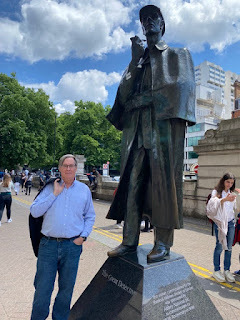
How do you define the word “Sherlockian”?
Sherlockians start with the Canonical stories, and move out from there. Reading and re-reading them, Sherlockians delight in noticing new details, or making connections, especially with other aspects of Victorian and Edwardian life, and sharing those observations with similarly-obsessed people. That’s the essence of “the game” – seeking new insights and taking pleasure in sharing them.
How did you become a Sherlockian?
I sort of backed into it. My first exposure to Holmes was reading The Hound of the Baskervilles in English class in seventh grade. We also read Treasure Island, and those along with a fair amount of Dickens, Melville, and Mark Twain in high school pretty well hooked me on the literature of the second half of the nineteenth century. I’ve always also enjoyed detective fiction, but I didn’t really go back and read the Canon until after I had completely devoured the Nero Wolfe stories and everything by Dashiell Hammett. The Holmes stories, of course, proved to be the ideal point of intersection between those two literary tastes, and I eventually discovered the world of enthusiasts dedicated to enhancing one another’s enjoyment of all things Sherlockian.
What is your profession and does that affect how you enjoy being a Sherlockian?
My main field of study was finance, and I’ve had my own independent investment management firm for the past twenty years. So, I’m naturally most attuned to the stories that have a financial element – counterfeiting, securities theft, fraud, that sort of thing. Quite a number of the stories mention in passing some financial element that you might “see, but not observe” unless you’re on the lookout for it. There’s also a surprising amount of financial crime in the Canon, and the other sorts of crimes in many Canonical stories have financial motivations. Since Arthur Conan Doyle was a physician, the amount of financial matter in the Holmes stories seemed surprising to me at first, but as I’ve learned more about Victorian England, I’ve realized that he presented financial matters in ways his audience would have found familiar.
What is your favorite canonical story?
That changes from time to time, but right now it’s “The Adventure of the Stockbroker’s Clerk.” Here a young man lands a prime clerkship at one of the most prestigious firms in The City – The City (of London) is to the British financial markets as Wall Street is to the American – yet he still falls prey to an offer from another quarter that is too good to be true, but too good to refuse. His error opens the way for an attempt at a large theft of securities. The City connection alone is enough to draw me to this particular story. I also like it because while big securities heists were actually rare, they are easy to imagine, and the other main elements of the story, including the scheme appealing to the everyday cupidity of a normal person and even the fraudulent, pop-up office in an out-of-the-way place, resembled features of real swindles in Victorian England.
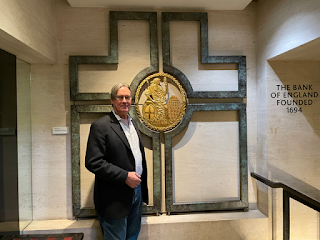
Who is a specific Sherlockian that you think others would find interesting?
The Sherlockian I would most like to have had the chance to meet would have been Rex Stout, the creator of Nero Wolfe, but I’m afraid it’s a half-century too late for that. But to answer the question you actually asked, I have to nominate Nicholas Meyer. Nick is a film director and screenwriter (his credits include three of the original-cast Star Trek films), and an author. His first Sherlock Holmes pastiche, The Seven Per-Cent Solution, came out about the time I started college, and I recall it as having been enormously popular among my friends. His most recent, The Return of the Pharaoh, came out last year. Nick is always careful to respect the conventions and timelines of the Canon, so his stories extend the Holmes narrative in ways that modern-setting dramatizations do not. Nick also uses his extensive knowledge of literature and music to enliven his creative work – who else could manage to insert a Holmes reference into a Star Trek script?
I also have to mention Candace Lewis. Because her expertise, primarily in art, is so much different from mine, I always learn a great deal from even the briefest interaction with her. For that reason, talking with her stands out in my mind as an example of the pleasures of trading ideas and observations with other Sherlockians.
What subset of Sherlockiana really interests you?
I suffer from a fascination with the literary tradition of which Arthur Conan Doyle and Sherlock Holmes are part. Edgar Allan Poe and Bret Harte were important antecedents (though Sherlock tweaks Poe a bit in A Study in Scarlet), and of course Conan Doyle has countless literary descendants, from Agatha Christie and Dorothy Sayers, to Dashiell Hammett and Rex Stout, and more. All of these authors wrote for a popular audience, and yet they elevated their stories far enough above the general run of popular culture that we still read, study, and enjoy them.
How do you feel that West Coast Sherlockiana is different from those in the Midwest or East Coast?
I suppose I should have a view on this question, since I grew up in the Midwest, spent about 15 years on the east coast, and have lived for decades in California. So if you’ll permit me to talk out of my hat a bit, I’ll give it a try. I’d say that here on the West Coast, we’re perhaps a bit more likely to regard screen adaptations, especially of Canonical stories, as legitimate Sherlockiana, and we may also lay special emphasis on Conan Doyle’s skill as a storyteller. East coast Sherlockians may take a somewhat more academic approach to Holmes scholarship, and Midwesterners may be more likely to focus a bit more closely on the original text. But there are objections to those views, too. After all, most of the best screen adaptations are British, rather than Californian, productions – re-reading the Canon, I hear Holmes speaking in Jeremy Brett’s voice. And one of the best resources for academic study of Sherlockiana is the Sherlock Holmes collection at the University of Minnesota.
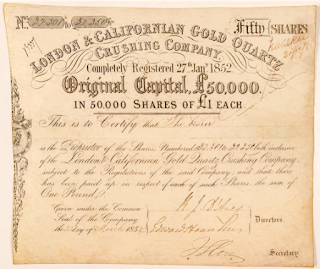
As an amateur historian, how does that influence how you enjoy the Canon?
My chosen topic is economic and financial history. I started by studying banking and finance in Gold Rush California, but soon fell prey to the historian’s most nettlesome question: “Interesting, but I wonder – what happened before this?” The result is that I’ve learned enough about the economic history of the eastern half of the North Pacific Basin to become a tiresome dinner companion. While the Holmes stories take place at least a quarter century after the end of the period I’ve studied most deeply, their economic and technological backdrop feels familiar. The 1850s saw rapid development of steamships, railroads, and telegraphs; by the 1890s they were commonplace. A growing middle class in both Britain and America had disposable income both to buy the Strand magazine and to experience first-hand the temptations and perils of the types of speculations that sometimes figure as plot points in Holmes stories. And, of course, the frequency with which the stories concern fortunes made in India, South Africa, South America, Australia, or even California would have seemed entirely reasonable to English readers at the height of the British Empire.
What book would you recommend to other Sherlockians?
For something a little out of the ordinary, I’d suggest Brian McCuskey, How Sherlock Pulled the Trick: Spiritualism and the Pseudoscientific Method (State College: Penn State University Press) 2021. Some Sherlockians might object to it, as McCuskey’s two-fold thesis both takes on Arthur Conan Doyle’s belief in Victorian spiritualism and argues that Holmes’s reasoning in the stories is not always so watertight as it may seem. He particularly examines Holmes’s apothegm about exhausting possibilities until only one remains. But it’s a fresh look at well-trod ground, and a sufficiently open-minded reader should at least find it thought-provoking.
Where do you see Sherlockiana in 5 or 10 years from now?
Advancing, I hope. But seriously, we mostly need to keep introducing young people to the pleasures of all things Sherlockian – maybe starting with a movie, or a TV adaptation, but then without wasting too much time moving them on to the Canonical stories themselves, so that Arthur Conan Doyle can do the rest. One event that will fall within the time span in your question is the centennial of Conan Doyle’s passing. Sherlockian societies around the world will surely mark the occasion with events, exhibitions, and conferences of various types, as well we should.
Perhaps a theme for such an event, and perhaps the animating question for Sherlockians in this upcoming period, should be, to whom does Sherlock Holmes belong – not as a matter of intellectual property, but as part of our shared cultural legacy? If Holmes by then belongs to all of us, then how shall we best balance the merits of preserving the original Holmes, as though in amber, with the benefits of cultivating an evergreen Holmes, adapted to the current age? Whatever the answer (and answers will vary and inevitably clash), I do hope we remember to keep listening to the voice from 1895 that still has so much to say to us in 2022, and will still in 2030 and beyond.
August 14, 2022
Interesting Interview: David Marcum
Every Sherlockian brings their own set of skills to this hobby of ours. For my money, this week's Interesting Interviewee's big skill is energy. David Marcum is a prolific Sherlockian author, editor, collector, chronologist, and unabashed fan of the written word. I've followed David's blog for a while and am always entertained by what he has to say and when I published my first book with MX Publishing back in 2017, they had a million good things to say about David.
But it was having David be a part of The Finest Assorted Collection anthology that really helped me to understand this guy's devotion! David has the world's largest collection of Sherlock Holmes pastiches as far as I can tell. But David puts his money where his mouth is, too. He's written many of his own pastiches and edited a staggering amount of works by other Sherlockians. But let's let him tell his own story. Buckle up, because this guy has enough energy for ten of us!
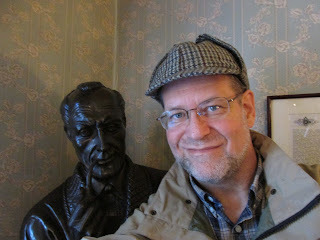
How do you define the word “Sherlockian”?
First of all, thanks to Rob Nunn for the opportunity to participate in this series.
Every time this question has been asked in previous interviews, I’ve read with great interest, and I really liked Janice Weiner’s recent answer(from July 24th, 2022) when she said that a Sherlockian has read The Canon. To me, however one finds their way here, they should read the Original Texts to understand the Original Holmes.
Contrary to the public persona I cultivate, I actually have a lot more interests than just Sherlock Holmes, and I try to keep in mind with each of them whether I’m simply a casual fan, or someone has made the extra effort to know the true original version of something. I’m in a number of groups – such as those related to Hercule Poirot or James Bond or Father Brown – where the casual fans only know (and only want to know) what they’ve seen from film versions, and they’ve never – sometimes proudly – bothered to go back and read the original books in order to understand the actual characters, settings, time periods, context, etc. Without putting in the work to have that baseline knowledge, they don’t truly understand what they’re a fan of.
I believe that it's the same in the Sherlockian World. If one only knows Holmes by way of media representations, for instance, or from recognizing a few well-known identifiers (such as a deerstalker), without knowing that the original Canonical stories occurred from 1881 to 1914, then one isn’t yet a Sherlockian. Casual fans are wonderful – we all started that way – and should be welcomed and encouraged, but for some of us a deeper spark was ignited, motivating us take those extra steps: To read more. To seek out and study and ponder more. That’s when you become a Sherlockian.
How did you become a Sherlockian?
Like many, I was aware of Holmes before I took the deeper Sherlockian dive. When I was eight, I read my first mysteries, some of which mentioned Holmes, and that’s also the time when I read my first Solar Pons story, in a kid’s mystery anthology – so I’d seen the Holmes and Watson model before I “found” Holmes when I was ten, in 1975. One Saturday, I saw a re-run of A Study in Terror (a pastiche) on television and was then moved to read my sole Holmes book, an abridged copy of The Adventures. After that, I started reading whatever about Mr. Holmes I could find – The Canon, and at the same time the few pastiches that were then available.
I feel that my transition to an actual Sherlockian came down to a single electric moment. For my twelfth birthday, I requested and received the boxed set of Baring-Gould’s Annotated Sherlock Holmes. I’d already devoured B-G’s Sherlock Holmes of Baker Street a year or so before, but the Annotated version went to an entirely different and much deeper level – and when I flipped to the back and saw page after page of bibliographic references, it was like my head exploded – There was so much more about Holmes out there than just the sixty stories that I’d read and re-read, and I hadn’t known about any of it! And I wanted to know more – but there wasn’t very much Sherlockian scholarship or fellowship to be found in 1970’s East Tennessee, so I spent years – decades – as a solitary Sherlockian, reading Canon and pastiche and spinning my own theories and notions in solitude. I’m actually listed as a Sherlockian society of one person – The Diogenes Club West (East Tennessee Annex) – on Peter Blau’s List of Sherlockian Societies
For years, the only Sherlockians I “knew” (and this was just through telephone calls and letters) were Carolyn and Joel Senter, because their Classics Specialty catalogs were always the basis on of my birthday and Christmas wish lists. Somehow – maybe from them – I heard about From Gillette to Brett III in November 2011, and when I saw that both Nick Meyer and Bert Coules were going to be there, I impulsively decided to make the six-hour drive. As many have noted, one’s first visit to a Sherlockian event is magical, and the people are wonderful. Living where I do, it’s a serious commitment to travel to any Sherlockian gathering, but I’ve been to all of the later From Gillette to Brett’s, as well as occasional visits to TheNashville Scholars (my home Scion), and once to the Sherlock Holmes Birthday Weekend in New York (in January 2020 – when COVID was probably already among us, but we didn’t know it yet). Luckily, in this day and age, contact with other Sherlockians can be maintained electronically when seeing one another in person doesn’t work out.
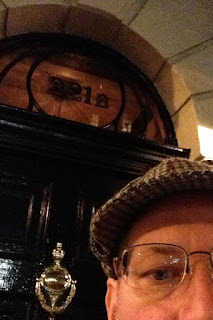
What is your profession, and does that affect how you enjoy being a Sherlockian?
I’ve actually had a few professions, and I think that each has been influential. After college, I was a U.S. Federal Investigator for a number of years, and I traveled to various parts of the country and was able to indulge in my life-long habit of visiting bookstores, where I always bought Sherlockian volumes when I unexpectedly found them – both pastiches and scholarship – knowing that it’s best to grab them when one has the chance, because to go back and try to acquire them later is much more difficult and expensive.
After our federal agency was abruptly closed, I went back to school for a second degree in Civil Engineering – and being a student for a while was almost a career in itself. That time allowed me to take being a Sherlockian to a much deeper level. I was the supervisor at a full-time night job where I could study when things slowed down, and after doing my homework, I would read and re-read Holmes – both The Canon, as well as all of the pastiches I’d acquired over the years. It was then that I started making notes for what would eventually become my massive Canon and pastiche chronology, now over 1,000 dense pages, integrating novels, short stories, radio and television episodes, movies and scripts, comics, fan fiction, and unpublished manuscripts by year, month, day, and even hour. Also, I first truly discovered the internet while at school, and I was able to locate thousands of online traditional pastiches that I printed, read, chronologicized, and archived. (It’s a good thing, as many of them have since otherwise vanished.) I also learned of and managed to down and acquire many other pastiches in book form.
As a civil engineer, I’ve been able to continue collecting, and being an engineer has provided useful skills in the areas of editing and writing about Holmes, both of which have involved a certain amount of my time in the last few years. All of these professions have taught me that the only way that a project or task gets done is to sit down and do it. In each of these careers, managing tasks was essential. As a federal investigator, I usually had six to ten active cases on hand, and now as a senior civil engineer working for my hometown’s public works department, we usually have that many simultaneous ongoing projects. Writing new stories and editing anthologies is like managing those cases or projects – keeping an eye on all the pieces, and always working on some part of it and making forward progress so that when one part comes to a temporary halt, there’s always something else to address.
What is your favorite canonical story?
Like many, I think that my favorite Canonical adventure changes all the time, depending on the day, or what I get out of it during a particular re-read. Sometimes my temporary favorite is based on a story of my own that I’m writing if it happens to either be a direct sequel to a Canonical story, or if it uses one as a jumping-off place. (For example, I recently wrote a Solar Pons adventure where Pons’s client is an elderly Hall Pycroft. The story never mentions Holmes or the events of “The Stockbroker’s Clerk”, but for those who recognize Pycroft’s name and a few other Easter Eggs, it’s a nice semi-sequel.)
I guess if really pushed into a corner – and I’ve saved this difficult question for last – my answer today is “The Abbey Grange”. The setting and deductions are spot-on. It has a murder – and a heroic fellow who commits it for the right reasons. Watson is “a British jury”, and there was never “a man who was more eminently fitted to represent one,” while Holmes is the judge, stating, “Once or twice in my career I feel that I have done more real harm by my discovery of the criminal than ever he had done by his crime. I have learned caution now, and I had rather play tricks with the law of England than with my own conscience.” Some of the best of later Nero Wolfe and Ellery Queen mysteries place those heroes in the same judge-like position.
Ask me tomorrow, and I’ll pick something else, but today I choose this one.
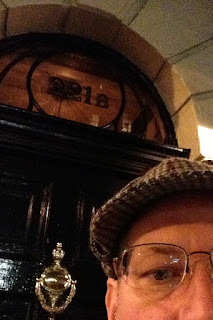
Who is a specific Sherlockian that you think others would find interesting?
I’ve met so many amazing Sherlockians in the last few years (both in real life and online) that it’s very difficult to narrow the list down to just one, but I think that many would agree that the Sherlockian who has done so much for so many – authors, readers, and charities – is Steve Emecz.
In 2013, I rather timidly approached Steve by email to see about reprinting my first little-known pastiche volume, The Papers of SherlockHolmes. It turned out to be one of the most life-changing actions I’ve ever taken, leading me to all the fun and opportunities that I’ve had since. Steve has encouraged every idea that I’ve had, and he does the same with other authors.
Very early, Steve understood that the power of print-on-demand, combined with the internet, was the new publishing paradigm, especially when compared to the old ways of pre-printing vast numbers of just a few titles that take forever to actually be published, and then end up sitting around in boxes or on warehouse shelves, to eventually be sold – or not. MX Publishing was originally a non-Sherlockian company, but when Steve was initially approached with a Sherlockian title, he realized that this was a vast market ready to be explored. I wasn’t one of his very first authors, but I’ve been with MX for nearly a decade now, and it’s left me in awe to see how it’s grown, and all that it’s done for both authors without any other possibility of ever cracking the old paradigm, and for readers like me who want more and more Holmes, but can’t wait for the little bit that trickles through by way of the old publishing pathways. (In some ways, Steve’s method of getting Sherlockian material to the masses makes him a modern-day Sherlockian Gutenberg.)
Steve works closely with Derrick and Brian Belanger, founders and owners of Belanger Books – and two other good friends who are super-high on my list of Interesting Sherlockians. One would think that Steve’s MX Publishing and Belanger Books would be rivals, but in fact they work together closely for the betterment of the entire Sherlockian community, supporting each other’s projects, and each in turn supporting a number of charities. I’m extremely lucky to be associated with all of them.
What subset of Sherlockiana really interests you?
Pastiches, of course. By far, what I want are more and more Holmes adventures. I found pastiches (in the form of the first two Nick Meyers novels) before I’d even read all of The Canon, so to me, a good pastiche is just as enjoyable and important as the originals. I’ve written elsewhere that there are three legs to the Sherlockian stool: The Canon, scholarship, and pastiches. I think that the latter doesn’t get nearly enough recognition. After all, when one looks back at any of the great resurgences of interest in Holmes – the kind that bring in new blood into the fandom – it’s usually been because of pastiches – William Gillette’s play, for example, and the Rathbone films. Nick Meyer’s The Seven-Per-Cent Solution (1974) started a Golden Age that’s never really ended. Various film and television pastiches since then have also generated new waves of interest.
Some find The Canon first, but many more get there by way of pastiches. Some people dig even further for the scholarship, but many will never see any of that, as often it isn’t easily available or affordable to general readers – but those same general readers can always find good pastiches, especially these days when so many authors are working so hard to produce them, and MX and Belanger Books are delivering them.
In 2008, I was laid off from a civil engineering job and decided to use some of my free time to write my own pastiches – as I’d always wanted to write. Over the next few weeks, I completed nine adventures – and then did nothing with them for several years. Eventually I showed them to a few people and, from their encouraging responses, got the urge to share them in a real book. The Papers of Sherlock Holmes was initially published by The Battered Silicon Dispatch Box in 2011, and then I moved it to MX Publishing in 2013. After that, I wrote a Holmes novel, Sherlock Holmes and A Quantity ofDebt (2013), and another volume of short stories, Sherlock Holmes:Tangled Skeins (2015). Others have followed.
In early 2015, I came up with the idea of the MX anthologies and wrote a story for that. Other anthologies followed, and I wrote stories for all of them – both those that I’ve edited for MX and Belanger Books, and also for other publishers, and magazines as well. Overall (as of this interview,) I’ve written 98 Holmes pastiches (and 27 Solar Pons pastiches, which are very much like Holmes adventures), and I have requests to write six more Holmes stories by the end of the year. In addition to enthusiastically supporting pastiches, I also put my efforts into writing more of them.
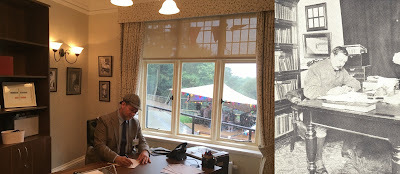
As editor of more than 50 Sherlockian books, what are some memories that stand out from all of your work?
I never thought that I’d be editing Holmes pastiches – and now I’ve edited about 1,000 of them. I’d always wanted to write Holmes stories, but I only dipped into editing because I desired more adventures of the type that I wanted to read. I literally woke up one morning in early 2015, having just dreamed that I’d edited a Holmes pastiche volume. I ran the idea past a few friends and publisher Steve Emecz, and after they were encouraging, I began reaching out to pastiche authors. I had the feeling that I’d be lucky if I received a dozen new stories to make up a small paperback. Instead, the participation turned out to be much bigger than that. That first set grew to three massive simultaneous volumes of over sixty stories, and a few weeks after these were published, people were already asking about the next set. It was never meant to be more than a one-time thing, but the system was in place, so I solicited stories for another volume. And it’s just kept going . . . .
The MX Book of New Sherlock Holmes Stories has now grown to 33 published volumes, and I’m currently editing Parts XXXIV, XXXV, and XXXVI, while soliciting stories for Part XXXVII – and possibly for Parts XXXIII and XXXIX too! We now have over 750 new traditional Canonical stories from over 200 contributors worldwide. Early on, we decided that the royalties would go to the Stepping Stones School (now known as “Undershaw”) for special needs children, located at Undershaw, one of Sir Arthur Conan Doyle’s former homes. As of earlier this summer, the books – by way of the first-rate author contributions and fan support – have incredibly raised over $100,000 for the school – and officials at the school have told me that even more important than the money is the fact that the books have raised awareness of the school around the world.
I have many amazing memories associated with these books. Early on, simply receiving new stories when I didn’t know if anyone would contribute at all was a thrill – and I’ve never stopped being thrilled when a new adventure shows up in my in-box. (I now get over 200 new stories each year for different anthologies, and the idea that people are sending me new Holmes adventures every few days still blows my mind!) By way of the MX anthologies, I’ve been able to edit a number of other Holmes collections for Belanger Books. I’ve also had the opportunity to meet hundreds of wonderful Sherlockians – in person or online – that I wouldn’t have known otherwise, and I’ve been able to play in the Sherlockian sandbox when I probably wouldn’t have found a way to otherwise.
In Fall 2015, I was able to go to London and the launch party for the first three MX volumes. In 2016, I was invited back as a guest of honor at the Stepping Stones School for their Grand Opening celebration at Undershaw. And I hope to get back again when the world settles down a bit more.
Just this year we passed the $100,000 amount raised for the school, which I’m still getting used to. When I edit the books – receiving and editing stories, communicating with authors, etc. – it’s all a very solitary thing. By the time the latest set of the books is published, I’m already deeply into the next volumes and the others are way back in my rear-view mirror, so I only have a vague sense that they’re now out there in the real world, and that other people are finally reading them. So when I looked up and we were at $100,000, and I contemplated just how many people had actually bought and read and supported these books, which all started as individual stories arriving in my inbox, I was stunned.
How did you become a pastiche collector?
That goes back to when I first discovered Holmes at age ten in 1975. I had an abridged copy of The Adventures, and next I found a paperback of The Return. (Thus, I read “The Empty House” before “The Final Problem”, and learned how Holmes had survived Reichenbach before I ever knew that he’d supposedly died there!) Not long after, I found Nick Meyer’s The Seven-Per-Cent Solution, and then his follow-up The West End Horror (still one of my favorite pastiches of all time) – both before I’d finished reading The Canon. Not long after, I received and read Baring-Gould’s Sherlock Holmes of Baker Street – so the idea of pastiches intertwining with The Canon was fixed early on, and it made perfect sense to me. Good pastiches support and augment The Canon. I’ve repeatedly called the entire Canon and pastiche construct The Great Holmes Tapestry, with The Canon serving as the main threads, and pastiches making up all the fibers in between that give added color and nuance and depth.
In those early days, pastiches were extremely difficult to find, but even as a kid I haunted used bookstores. As I grew, I had more opportunities to acquire Holmes books and stories that I hadn’t known about. When I went back to college for a second degree, my rooting around for pastiches went to a much greater depth, and I dug up literally thousands of them – both online stories that I printed and saved, and physical books. Since that time, it’s only grown exponentially and, except for a few oddities and rarities, I believe that I’ve collected just about every traditional and Canonical pastiches that’s ever been written. (Perhaps this is a good time to mention that my wife of thirty-four years is a most incredible and supportive person!)
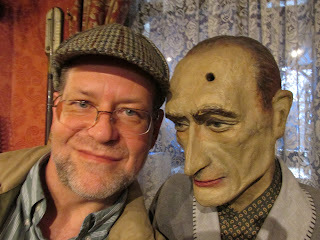
What book would you recommend to other Sherlockians?
This is maybe the toughest question, because there are so many I want to mention. I’m going to cheat and recommend several. The first is Baring-Gould’s Sherlock Holmes of Baker Street, because it threw open the door that there is more to Holmes and Watson’s lives than the infinitely small amounts recorded in The Canon. Then there’s Nick Meyer’s The Seven-Per-Cent Solution. I don’t think it’s his best pastiche, but it was the first little grain of sand that became the still-growing avalanche of modern Sherlockiana. Additionally, it let people understand that Holmes adventures can be good – or great – without having crossed the First Literary Agent’s desk. Finally, there’s the 3-volume set of The Canon edited by Edgar W. Smith (the Heritage Press edition, with the raised silhouette of Holmes as by F.D. Steele on the covers). This version doesn’t have all the extras of the four Annotated Canons (Baring-Gould, both Klingers, and the Oxford), but it’s an edition of the Holmes stories prepared by a Master Sherlockian – a true labor of love – and it’s what I use when re-reading The Canon.
Where do you see Sherlockiana in 5 or 10 years from now?
Well, Sherlockiana certainly won’t diminish in any way. Interest in Holmes – or other Holmes-like characters – is always there. Sometimes – like when I read a Solar Pons tale two years before discovering Holmes, or when someone enjoys House and doesn’t realize that he’s very Holmes-like – people are getting exposed to the Holmes Pattern and they don’t even realize it, so when they do encounter the legitimate Holmes, they’re already primed to enjoy him.
New Holmes projects will always be in the works. I believe that my own area of interest – more and more stories in the Canonical mode – are well-assured of continuation. I sometimes write that I’m a Missionary of The Church of the Canonical Holmes – and it’s good to feel confident that Holmes will stay around. With the new publishing paradigm opening the door to so many authors who previously had no good outlets, and the availability of new adventures in all sorts of formats for the ever-growing group of readers who want them, the Holmes genie is truly, finally, and wonderfully out of the bottle.
Thanks again including me in this project!
July 24, 2022
Interesting Interview: Janice Weiner
Janice Weiner is a Sherlockian that not enough people know about. Invested into the Baker Street Irregulars this year, she is clearly someone who has been contributing to Sherlockiana for some time now. But she's not one to toot her own horn. So I'm going to toot it for her!
Janice has a history of giving great talks and toasts and has earned the Fortescue Scholarship. She's a member of a ton of Chicago area Sherlockian societies, and has run the Scotland Yarders for over ten years, after being a founding member and editor of the scion newsletter. She's a familiar face at many functions, including BSI Weekends, Minnesota conventions, and the recent Celebration of Sherlock Holmes. So let's get to know our fellow Sherlockian this week, Janice Weiner!
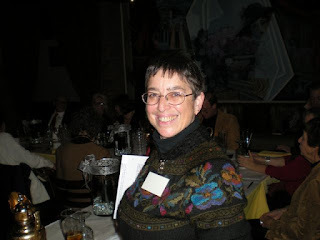
How do you define the word “Sherlockian”?
A Sherlockian is a person who has read the Canon. The person has succumbed to Holmes’s allure however finding out about him. Whether or not that person came to reading the Canon as a child or after seeing one of the TV shows or movies showcasing Holmes, perhaps as an adult, I believe having read the Canon a person can intelligently talk about portrayals of Holmes (and the Canonical stories). If one does not know the original Holmes, how can one discuss the differences in all the versions of stories, etc. with any validity? But, a Sherlockian does not have to focus on the original Canon. Have fun with Holmes whether in cosplay, alternative versions of stories, etc. Just read the original Canon at some point.
How did you become a Sherlockian?
I read my first Holmes story as a ten-year-old. It was an abridged "The Adventure of the Speckled Band" in a Reader’s Digest book for kids. Later on, I believe while in college, I read the Doubleday collection of the Canon. I had been going to Scotland Yard Books for some time and was intrigued when the store started a scion, obviously The Scotland Yarders. I attended the organizing meeting and have been involved in the group ever since. Through the Scotland Yarders I became aware of other scions and the widespread interest in Holmes.
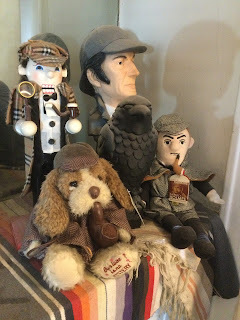
What was your profession and does that affect how you enjoy being a Sherlockian?
When I was teaching (I was a junior high school librarian) I worked with two 8th grade teachers to introduce Holmes to the students. One teacher had me talk about Holmes and the other had me create a weeklong unit about Holmes and the Victorian Era. Unfortunately, when those teachers retired Holmes was booted from the curriculum.
I taught some multimedia classes. When talking about genres I talked about Holmes and one group made a Holmes “film”. I very much enjoyed any time I could introduce students to the Canon. Being a teacher has made it easier for me when I have to talk to adults about Holmes, create quizzes, and other such activities. I had to plan my teaching lessons and it has helped me plan agendas for meetings and so on.
What is your favorite canonical story?
My favorite story might just be "The Adventure of the Speckled Band" as it was my first foray into the Sherlockian world, but I also enjoy "A Scandal in Bohemia." I love Irene Adler in men’s clothes as I dislike dresses, etc. Too uncomfortable!
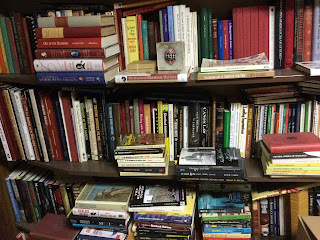
Who is a specific Sherlockian that you think others would find interesting?
I can’t pick a specific Sherlockian I find interesting as I’ve had many conversations with interesting Sherlockians. I don’t know many so well that I can choose a winner in this category. I will mention that two people were mentors to me.
One, Fred Levin, is deceased, but Fred worked at Scotland Yard books. He always recommended books for my growing collection of Sherlockian books and he always talked about the BSI weekends. He introduced me to the world outside of the local Sherlockian scene even as he also introduced me to local scions.
Terry McCammon and I hit if off while being snarky at a Sherlockian meeting (I suppose I should not admit this). Terry would talk about the BSI weekend too. I had a number of years previously been to a couple of the events, but wasn’t planning on going to NY again. I am not a good traveler and Terry (and his wife) let me travel with them when they went to NY. Terry introduced me to a number of people I never would have met otherwise. In doing so, I believe he helped me become a BSI member as I found out he also asked people to “write” for me to become one. People who now knew me wrote for me and that did the trick. I never really told Fred how much I appreciated his mentorship, but I have told Terry so.
What subset of Sherlockiana really interests you?
You, Rob, have forced me to think more about what I like about the Sherlockian world and my interest in Holmes. I do enjoy reading pastiches that I feel “get it right” about Holmes and Watson. If I can hear Jeremy Brett saying some of the dialog in a pastiche, I usually like it. But I like collecting any number of Sherlockian things. I am certainly not John Bennett Shaw, but I have a variety of things in my collection.
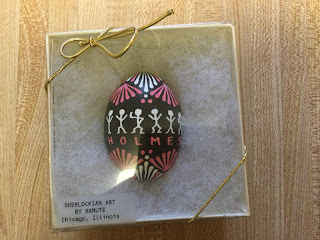
What does the Chicago Sherlockian scene look like?
The Chicago Sherlockian scene is not what it used to be. People have gotten older and passed away and there has not been an influx of new or younger folks to take their places. Many Chicago Sherlockians belong to more than one local scion and so we see the same folks, rather than a variety of members. We all have lost members who had media contacts and used to promote the scions. No one now has come up with a good way to attract more people.
I do not use social media. When I tried Facebook once I got replies assuming the Scotland Yarders were a Facebook group. The Scotland Yarders and most other local scions prefer in-person meetings. One new speaker for my group did not get anyone to attend the meeting after promoting it on his Facebook page. That is discouraging. Right now one scion is still only on Zoom. Another scion has barely met in the last few years and another hasn’t met since before the pandemic. My scion is very tiny, but I’m working to keep it going. So, the local Chicago scene is not in good shape.
You were an integral part of creating The Digital Muse, CDs that digitized every Serpentine Muse from 1975-2015. What was it like working on such a large project?
I proofread the index for the Serpentine Muse (though not for a number of years now). It almost drove me crazy. I had to go through quite a number of years checking all the names, article titles and such for spelling mistakes, for consistency in author names, and, often checking page numbers. I spent a lot of time on it and thought, at one point I was going to give the task up. I was looking at reproductions of articles on the computer and it was hard on my eyes. But, as a librarian, I was glad to sort things through and help create an accurate index. I thank Monica Schmidt for setting up the task for me as it led to me becoming an ASH.
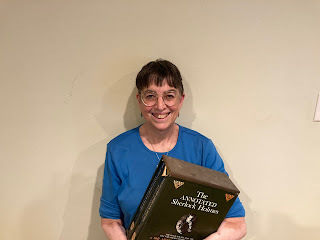
What book would you recommend to other Sherlockians?
It’s hard to recommend a book to Sherlockians. Most Sherlockians I know have so many books already. If a person is new to the Sherlockian world, I would suggest Baring-Gould’s and Les Klinger’s annotated Canons.
Those books will help a new person understand the references to the time in which Holmes worked. If a person has not read a lot of history, the Victorian Era might be a mystery to the person and needs explanation. I had to explain quite a bit to students when I introduced them to Holmes’s world.
Where do you see Sherlockiana in 5 or 10 years from now?
Hmmm? Where do I see Sherlockiana in the future? Well, in a number of places in the U.S. and the world there are vibrant scions that will keep the interest in Holmes going and going. I am not so sanguine about the Chicago scene. If we can keep the few newer scion members we have attracted, we may just keep the number of scions we have going, but I fear we may lose a scion or two or merge a few. I do think that if the wider world comes up with more TV or movie versions of Holmes, it will again attract people to our hobby and things, especially in area, will look even brighter.
July 17, 2022
Rediscovery of the Treasure [SIGN]
The Sign of Four is such a pivotal story in the Sherlockian mythos and chronology that a lot of us can rattle off it's highs and lows pretty easily. As I was reading it again this month, I realized that it had been a while since I'd actually READ this story, it's just one of those that's always part of conversations but I hadn't actually spent time with it from start to finish in years.
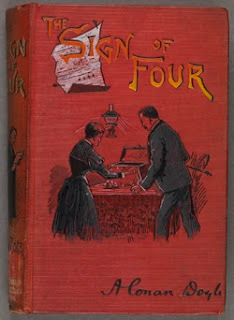
And like many novels of its day, there are some terrible aspects to it. Listening to Watson and Small talk about Tonga and Jonathan Small's retelling of his time in India is rough. But once I compartmentalize those aspects as historical relics, I find that I'm left with my favorite story of the Canon. I can't tell you how many times I've read this, but each time I'm surprised that I appreciate new things and some of my favorite aspects of this book still make me smile.
Of course, there's the famous opening scene of Holmes's cocaine and Watson's watch. For whatever reason, it hadn't dawned on me until this read-through that Holmes DID take the cocaine before he started analyzing the watch. That's coursing through him as he tells Watson his brother's life story and while he hears Mary Morstan's problem. It made me wonder what more he would have been able to decipher from the watch if he hadn't injected and if his mind was dulled during Mary's exposition, causing him to miss anything that could've helped out later on.
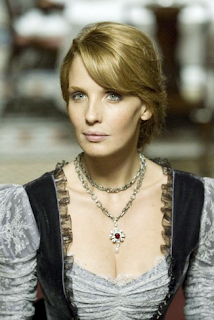
And yeah, Holmes is high when he's diagnosing Watson's brother's past, but man is he callous when he does so. We often see Watson wear his heart on his sleeve in the Canon, but here it it ripped open with every word Holmes says. Neither of them are happy with the other one after this. Thankfully Mary cuts through the tension with her case, but that tension still lingers after she's gone. Watson calls Holmes an automaton and inhuman and he criticizes Watson's emphasis of emotional qualities. If a new case can't completely smooth over all of the hard feelings, chances are that they were pretty raw after the watch incident. We can only thank Mary for intervening, because if the conversation had been left to its natural course, words may have been spoken that couldn't have been taken back. Mary Morstan may have actually saved the partnership of Holmes and Watson.
Speaking of Mary, I never noticed how often Watson tips his hand about their future in this story. "To this day she declares that I told her one moving anecdote as to how a musket looked into my tent at the dead of night, and how I fired a double-barreled tiger cub at it." "I have marveled at it since, but at the time it seemed the most natural thing that I should go out to her so, and, as she has often told me, there was in her also the instinct to turn to me for comfort and protection." "She has told me since that she thought me cold and distant upon that journey." Watson is telling the reader in these lines that he and Mary are together years after this story takes place.
Every time I read this book, I despise Thaddeus Sholto more and more. This guy sucks. I have a mystery to tell you, but please give me a medical exam first. We will need to go talk to my brother but I'm going to make everyone listen to my story first. It's time to leave, but let me "deliberately" wind up my hookah. My brother died, but I'm only worried about being a suspect. And this line is the worst one of all: "Had your father, Miss Morstan, refrained from throwing a strain upon his heart, he might have been alive now.” When I retold The Sign of Four in The Criminal Mastermind of Baker Street, one of my favorite parts was having Watson punch this guy in the face. He deserved it.
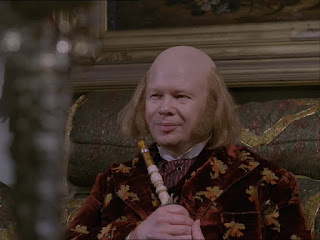 A very punchable face
A very punchable face“'God bless your sweet calm face!'” she cried, with an hysterical sob. 'It does me good to see you. Oh, but I have been sorely tried this day!' Our companion patted her thin, work-worn hand, and murmured some few words of kindly womanly comfort which brought the color back into the others bloodless cheeks." This is Bartholomew Sholto's housekeeper being soothed by Mary Morstan. I love that this aspect of Mary's character carries on through the years. In fact, Watson will tell us that "folk who were in grief came to my wife like birds to a light-house." (TWIS)
And soon enough we get to meet one of the best characters in all of Sherlockiana: Toby! Holmes knows how great he is. He calls Toby a good boy before their task has even started. As soon as he starts, Toby is whining eagerly as he trails the creosote. As he gets out into town, other dogs pay him attention, but Toby is fixated on his task. He's not doing this just because Watson gave him a lump of sugar. This dog knows his stuff. And when he gets to his barrel of creosote, Toby is looking for appreciation from Holmes and Watson. Does he know he got onto a different trail? No, he just knows that he followed the scent like he should. And Holmes and Watson burst into an uncontrollable fit of laughter at the end. Toby has finally brought these two back together after the previous day's strain!
 Every time I think of Toby, this is what I imagine
Every time I think of Toby, this is what I imagineWe soon get to meet another great character: Jack. “'Dear little chap!' said Holmes, strategically. 'What a rosy-cheeked young rascal! Now, Jack, is there anything you would like?' The youth pondered for a moment. 'I'd like a shillin',' said he. 'Nothing you would like better?' 'I'd like two shillin' better,' the prodigy answered, after some thought." Jack contributes nothing to the mystery or it's conclusion, but what a delightful exchange we get to have before Holmes is back to collecting clues!
And finally, the boat chase. Conveying action on the page isn't always an easy thing to do. You can feel the wind as Holmes and co. chase after the Aurora on the Thames. When Tonga's dart and Holmes and Watson's pistols fire, you are on the edge of your seat. I'm always ready to groan when they lose ground because of the other boat pulling out in front of them! This whole segment is masterful writing, and I always feel exhilarated when I read it.
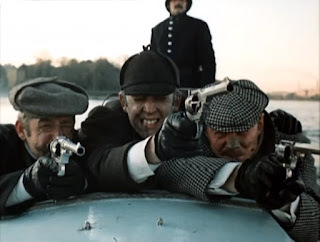
SIGN has been built up over the years for many reasons: racism, drug use, Watson's marriages, three-continent Watson, etc. but appreciated for what it's supposed to be, this book is still a ripping-good yarn.
July 10, 2022
Interesting Interview: Gabriele Mazzoni
Oh boy, is this week's interview a good one! Gabriele Mazzoni has one of the largest Sherlock Holmes collections in THE WORLD. I got to work with Gabriele for The Finest Assorted Collection, and learned very quickly that even though he could very easily be cocky and elitist about his collection, Gabriele is one of the nicest people I've ever emailed with. You can almost hear the smile on his face as you read his words.
His love for this hobby is infectious, as you will soon see. I hope to one day be able to get to meet Gabriele in person, and would expect any conversation with him to be as generous and rambling as his love for this hobby. Settle in, get ready to have your socks knocked off, and enjoy this interview with one of the world's leading Sherlockian collectors: Gabriele Mazzoni!
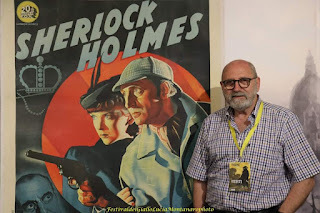
(Editorial note: Gabriele is not a fluent English speaker, so please forgive any awkward wordings. He translated his answers before sending them to me, and I made a few slight edits for clarity.)
How do you define the word “Sherlockian”?
“The Sherlockian" or, as we call it in Italy “the Holmesian", is a person who does not simply love Sherlock Holmes books, films and adventures. He is a person whose life is completely pervaded by him or by aspects of his saga. A Sherlockian constantly refers to phrases, thoughts, attitudes, and is mostly one who carries out for work, or more frequently for passion, activities related to the world of Sherlock Holmes.
How did you become a Sherlockian?
I became a Sherlockian very early: I was only 7 when I was watching TV shows with Sherlock Holmes played by Ronald Howard, the son of the more famous Leslie, actor of Gone with the Wind. RAI, the Italian television, had acquired the rights and broadcast the episodes in Italian. I was struck by that hero who, only with the use of reasoning, solved the most complex cases. My parents bought me some reductions for boys from the Canon, and the child's imagination quickly ran through the misty gas-lit streets of London, where horses' hooves thundered as Holmes demonstrated his skills to Watson in the warm lounge at 221 B.
As a teenager I began to read the Canon in its entirety, but also many apocryphal ones, the first of which was The Private Life of Sherlock Holmes by the Hardwicks. I also started reading non-Sherlockian works by ACD, first of all "Lost World", still my favorite today, and articles of Sherlockiana.
Also in those '70s I also began to collect books, magazines, small objects and it was the beginning of the "Disease"!
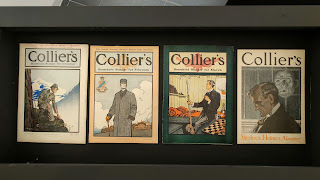
What was your profession and does that affect how you enjoy being a Sherlockian?
I am a Doctor of Medicine, currently retired for nearly three years. More than my profession has influenced being Sherlockian, I think the opposite has happened, at least to a large extent. The mental form of Holmesian reasoning - thanks to Dr. Bell - as we know is that of the scientist, and I began to treasure it from childhood. It came naturally to me to carry out scientific studies and then graduate in medicine. But I would also say that my specializations, and consequently the work I have done, are of Sherlockian extraction. I am in fact specialized in Public Health and Occupational Hygiene, and I have directed a Service and also a Department of Public Health for many years. Matters that through Epidemiology and the search for the causes of diseases require an iron logical-deductive reasoning, and why not, abductive.
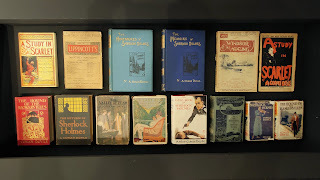
What is your favorite canonical story?
The first short story I read is also the one I was fond of, and therefore still prefer today: "The Speckled Band". I find the narrative inspiration brilliant and the unfolding of events is compelling. But, as I think many other Sherlockians, among the novels I love The Hound of the Baskervilles which is just as brilliant. It is no coincidence that the very first exhibition I set up, exactly twenty years ago, was about everything I had on HOUND at the time: 461 items including books, posters, objects, etc. .. Today I would have many, many more!
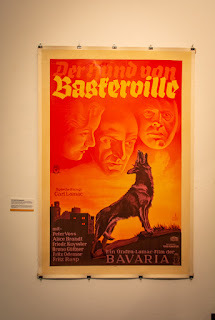
Who is a specific Sherlockian that you think others would find interesting?
I know a lot of Sherlockians all over the world, and many of them are interesting people in many ways. I would say that being Sherlockian is interesting in itself! However, I believe that for an interview it would be interesting to turn to Thierry St. Joanis, the President of the "Societé Sherlock Holmes de France". He is very knowledgeable about Holmes, he has taken care of and carried out many activities related to him and is a multifaceted and brilliant person, original in his initiatives. He is very funny and witty, he jokes with intelligence, which from Toscano I really appreciate!
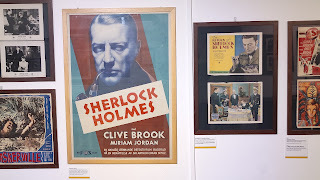
As a collector it is almost taken for granted that I am interested in Sherlockian books and magazines, mainly in the first and initial editions. As well as the movie posters. And this is demonstrated by the fact that I have about 25,000 of the former and more than 3,000 of the latter. And I also really collect everything about Sherlock Holmes and Arthur Conan Doyle. But there are two cool things that I really like and have a lot of fun with. These are vinyl records with movie soundtracks, audio books, songs dedicated to Holmes, singers or groups who call themselves or dress like Holmes, etc. I have over 500 Sherlock Holmes vinyl records.
Another sector of collecting that particularly fascinates me is that of the glass slides. Glass slides are early photographs when they were produced on glass. About twenty years ago I came across and bought a 1901 glass slide with a stage photo from Gillette's theatrical Sherlock Holmes on Broadway; since then I have found twenty original glass slides relating to films.
But going back to the glass slides, another strand of research fascinated me: to find images from the late nineteenth century and early twentieth century, taken in the precise places mentioned in the stories of Sherlock Holmes. I put all the Canon into a single PC file, and with the "find" function, I observe whether that given place of a specific slide that is for sale is mentioned or not: if yes, I will buy it, otherwise I leave it. I thus have about 200 glass slides mostly from London (only canonical streets and places), but also from Dartmoor, the Reichenbach Falls, and more. I bought an old working magic lantern, and I sometimes give presentations on modern and ancient locations. At first with a PC, I project a slideshow in PowerPoint, briefly talking about the history of the magic lantern. Then, I dim the lights, and talk about Sherlock Holmes, his films by him, and his adventures by him, projecting images of the most beautiful and representative glass slides. All of this with the background of vinyl records with some music mentioned in the Canon, such as Pablo de Sarasate played on an old original 78 rpm turntable from 1912, complete with an engraved brass horn!
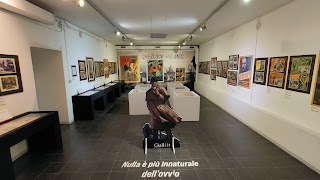
How did your collection begin?
My collection, which is currently marching towards 60,000 pieces, started already in the teenage years. But it was especially when I started touring Europe and other countries that it started to become important. I used to come home from trips with suitcases full of books and other items. I remember a trip to the United States from which I returned with an extra suitcase, and the ones I had, completely emptied of clothing (which I threw away!) to fill them with Sherlockian material!
Then the Internet made the difference: I dedicated myself from the beginning to research via the Web. In the early days I found people who sold everything without knowing what they really had. I bought very rare and expensive things cheaply. Today this hardly happens anymore.
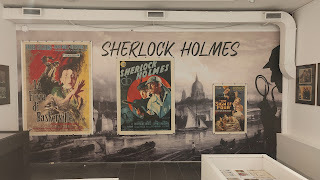
What are some of your favorite pieces from your collection?
The part of my collection that I am most proud of is the complete series of all 222 Strand Magazine singles (yes, 221 + 1 (!)) with the canonical stories of Sherlock Holmes, but also with many other writings by ACD. Accompanied by over 100 original semiannual volumes from Newnes. It took me decades to put it together. I also own almost everything that has been published in Italy on SH and ACD: thousands of very interesting and unique publications. I also have many movie posters that are considered to be one of a kind remaining and represent a great conservation responsibility.
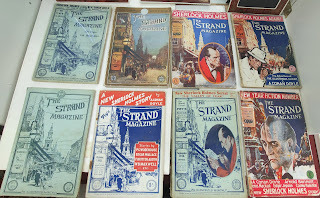
What book would you recommend to other Sherlockians?
I believe that every Sherlockian should have a copy of Green and Gibson with the bibliography of nearly all first century editions and beyond on Sherlock Holmes. To realize the editorial scope of the phenomenon and explain how it could have become so great.
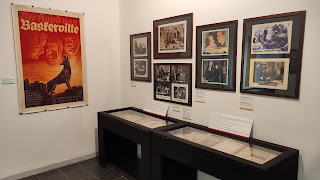
Where do you see Sherlockiana in 5 or 10 years from now?
Thanks to cinema, television and the large amount of Sherlockian publications that are regularly produced I believe that we will continue to be interested in them for a long time to come. What I hope is that at least a few people will continue to deal with scholarship, with "intelligent collecting", which gives meaning and study to each piece. But also the pleasure of reading paper books. ebooks and audio books are an excellent aid, but the paper book is another satisfaction. At least for someone who is almost 70 years old ... :-)
Thanks for your time and interest!
June 30, 2022
To Form the Amalgam [ENGR]
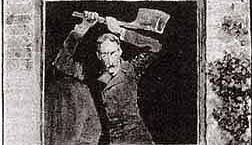
In "The Engineer's Thumb," Colonel Lysander Stark is our main antagonist. While not one that is normally listed as a best villain in the Canon, I think we are doing this malevolent German a disservice. What we have in this story is a baddie who may actually be a template for so many others to come later on in the Canon.
We are told repeatedly that Stark is thin, German, and a colonel. Another villain whose thinness will be accentuated? Professor Moriarty. A dangerous German? Von Bork. And a deadly colonel? Colonel Sebastian Moran.
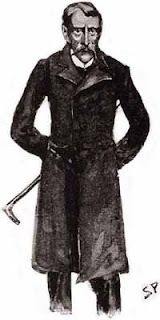
I admit, there's nothing ground-breaking there. Being thin isn't a major component of villainy, colonels aren't well-regarded throughout the Canon, and people from other countries are usually dangerous according the Conan Doyle. So let's look a little closer at Stark.
The colonel has done his research before reaching out to Victor Hatherley, knowing that he is an orphan, a bachelor, and lives alone. Beddington will do the same such research before he reaches out to Hall Pycroft in "The Stockbroker's Clerk."
Of course, we all know by now that when a stranger offers someone too much money for a simple job, things are suspicious. This strategy will be used again in "The Stockbroker's Clerk" and "The Copper Beeches."
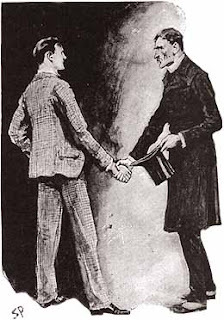
But Victor Hatherley isn't as smart as we are, and he agrees to go with Stark to his secluded house (cough, cough, "Wisteria Lodge") by way of a long, quiet, and disguised carriage ride like the one that will be repeated in "The Greek Interpreter."
Once there, Stark will be betrayed by a woman in his household, supposedly someone who in on his schemes, as she tries to warn away a man in danger. Sound like Beryl Stapleton from The Hound of the Baskervilles? Sorry, that story won't be written for nine more years. So let's stick with "The Engineer's Thumb."
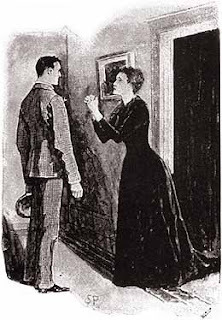
Hatherley soon learns that Stark is a counterfeiter, just like Killer Evans will be in "The Three Garridebs." But Colonel Stark is so fierce that he is not opposed to killing someone to achieve his mission, sort of like Hugo Oberstein in "The Bruce-Partington Plans."
Elise tries to stop Stark from killing Hatherley, insinuating that he has promised not to harm anyone after the last time. We will see James Wilder make a similar promise to his father later in "The Priory School."
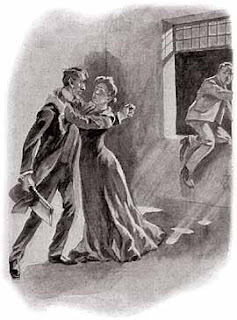
While listening to this story. Holmes says Colonel Stark is "a cool and desperate man." Jack Stapleton (HOUN) and Baron Gruner (ILLU) will both be described as "cool" by Holmes in later stories and George Burnwell (BERY), Giuseppe Gorgiano (REDC), and Von Bork (LAST) are all called "desperate."
We learn that Colonel Lysander Stark is actually an alias. But so is the identity this villain is using in town. The locals know him as a patient staying with Dr. Beecher. A villain pretending to be a resident patient? I'm sure that idea won't be used again.
And this "Dr. Beecher" is actually Stark's accomplice, who turns out to be softer-hearted than the colonel had counted on. Just like Jack Woodley will find out about his accomplice in "The Solitary Cyclist."
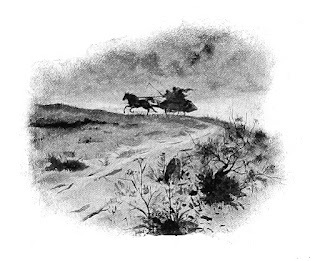
Of course, Colonel Stark escapes Sherlock Holmes. Another villain will escape justice just two months later in "The Beryl Coronet."
So while Stark may not be a top villain, I think this cleaver-wielding criminal should be recognized for laying the groundwork for so many malefactors that would come after him. Let's all give Colonel Lysander Stark a big thumbs up.
The Colonel First [ENGR]

In "The Engineer's Thumb," Colonel Lysander Stark is our main antagonist. While not one that is normally listed as a best villain in the Canon, I think we are doing this malevolent German a disservice. What we have in this story is a baddie who may actually be a template for so many others to come later on in the Canon.
We are told repeatedly that Stark is thin, German, and a colonel. Another villain whose thinness will be accentuated? Professor Moriarty. A dangerous German? Von Bork. And a deadly colonel? Colonel Sebastian Moran.

I admit, there's nothing ground-breaking there. Being thin isn't a major component of villainy, colonels aren't well-regarded throughout the Canon, and people from other countries are usually dangerous according the Conan Doyle. So let's look a little closer at Stark.
The colonel has done his research before reaching out to Victor Hatherley, knowing that he is an orphan, a bachelor, and lives alone. Beddington will do the same such research before he reaches out to Hall Pycroft in "The Stockbroker's Clerk."
Of course, we all know by now that when a stranger offers someone too much money for a simple job, things are suspicious. This strategy will be used again in "The Stockbroker's Clerk" and "The Copper Beeches."

But Victor Hatherley isn't as smart as we are, and he agrees to go with Stark to his secluded house (cough, cough, "Wisteria Lodge") by way of a long, quiet, and disguised carriage ride like the one that will be repeated in "The Greek Interpreter."
Once there, Stark will be betrayed by a woman in his household, supposedly someone who in on his schemes, as she tries to warn away a man in danger. Sound like Beryl Stapleton from The Hound of the Baskervilles? Sorry, that story won't be written for nine more years. So let's stick with "The Engineer's Thumb."

Hatherley soon learns that Stark is a counterfeiter, just like Killer Evans will be in "The Three Garridebs." But Colonel Stark is so fierce that he is not opposed to killing someone to achieve his mission, sort of like Hugo Oberstein in "The Bruce-Partington Plans."
Elise tries to stop Stark from killing Hatherley, insinuating that he has promised not to harm anyone after the last time. We will see James Wilder make a similar promise to his father later in "The Priory School."

While listening to this story. Holmes says Colonel Stark is "a cool and desperate man." Jack Stapleton (HOUN) and Baron Gruner (ILLU) will both be described as "cool" by Holmes in later stories and George Burnwell (BERY), Giuseppe Gorgiano (REDC), and Von Bork (LAST) are all called "desperate."
We learn that Colonel Lysander Stark is actually an alias. But so is the identity this villain is using in town. The locals know him as a patient staying with Dr. Beecher. A villain pretending to be a resident patient? I'm sure that idea won't be used again.
And this "Dr. Beecher" is actually Stark's accomplice, who turns out to be softer-hearted than the colonel had counted on. Just like Jack Woodley will find out about his accomplice in "The Solitary Cyclist."

Of course, Colonel Stark escapes Sherlock Holmes. Another villain will escape justice just two months later in "The Beryl Coronet."
So while Stark may not be a top villain, I think this cleaver-wielding criminal should be recognized for laying the groundwork for so many malefactors that would come after him. Let's all give Colonel Lysander Stark a big thumbs up.
June 26, 2022
Interesting Interview: Laurence Deloison
This January, Laurence Deloison was the first French woman to be inducted into the Baker Street Irregulars. And that is important enough itself to warrant an interview this Sherlockian that not enough of us Americans know well enough. But I am lucky enough to be a class member of Laurence's and through some emails and keeping up with her Facebook posts, I quickly learned that she's more than a history maker.
Laurence is the president of France's Sherlock Holmes society, Le Cercle Holmésien de Paris. But on top of that, she is a world traveler, energetic Sherlockian, and a friend to all that meet her. Laurence is one of those people that once you learn a little about her, you immediately want to learn more and more; she is that fascinating. So get ready to meet someone you're going to want to spend more time with in this week's Interesting Interview, Laurence Deloison!
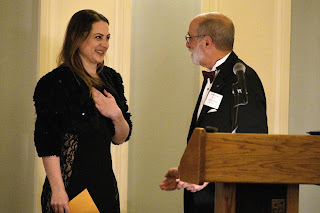
How do you define the word “Sherlockian”?
For me anybody who is a Sherlock Holmes enthusiast, and wants to share this passion with same-minded people. I don't make a distinction between someone who discovered the Sherlockian universe through the Canon, Rathbone, Cumberbatch, a pastiche or a comic book. All roads lead to Holmes!
How did you become a Sherlockian?
I was offered The Hound of the Baskervilles for my birthday when I was 10 or 11 years old. Love at first sight! I was already reading some Agatha Christie novels at that time, so I loved a good mystery. But here was this incredible character… Sherlock Holmes ! I went to the library to ask if they had more of it, and read it all during my summer vacation that year.
However I think I had already been exposed to Holmes earlier than that, with the Sherlock Hound animated series by Hayao Miyazaki which used to air on French tv. It really loved it as well.
Growing up Sherlock Holmes always stayed somewhere on my mind but I didn’t really have access to any other content. Until one day I caught some reruns of the Granada series on tv… which completely revived my interest. I was now old enough to travel on my own, so with a friend we bought a ticket to London and rushed to Baker Street. That was the first of many visits to the Sherlock Holmes Museum.
It also coincided with the arrival of the internet, which changed everything. I realized that there were so many movies or books I knew nothing about. But most of all, that I was not alone in my obsession and that there were even people calling themselves Sherlockians! I had to join them of course.

What is your profession and does that affect how you enjoy being a Sherlockian?
I work in the travel industry. For several years I was doing international sales for different hotel groups (I even worked for the canonical Hotel du Louvre in Paris). Hence my BSI name, “Claridge’s Hotel." Now I work for a company which specializes in expedition cruises to the polar regions, so I guess you could also call me Sigerson! Actually there is a direct connection to Conan Doyle who worked as a surgeon on a whaler in the Arctic. When I did my first trip to the Arctic, I read the diary of his voyage Dangerous Work, and I left it in the ship’s library at the end.
The great advantage of my work is that I get to travel a lot, which I will talk about later. But that also means that I sometimes miss some of our meetings in Paris…
What is your favorite canonical story?
They are many… But I think I would say "The Blue Carbuncle." First because who doesn’t love a good Christmas story? And I think it has everything: comedy, drama, some great deduction scenes, the Victorian society with the rich and the poor, and Holmes being magnanimous at the end.
I love the scene at Covent Garden where they are trying to get information about the origin of the goose, by pretending they have made a bet about it (which was reused in a very clever way in Sherlock BBC’s "The Hounds of Baskerville").
Who is a specific Sherlockian that you think others would find interesting?
What I love about meeting other Sherlockians, is that there are people from very diverse backgrounds, that I probably would never had met otherwise. And such interesting people! In the end, like Holmes and Watson, being a Sherlockian is very much about friendship. And I have made wonderful friends along the years.
One of them is Bonnie MacBird, who came to one of our meetings a few years ago. At the time she was doing some research for her first book Art in the Blood which is partially set in Paris. I am very happy to see that her series of Sherlockian novels has expanded, with a 5th one coming up soon.
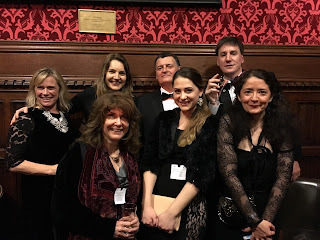
What subset of Sherlockiana really interests you?
I am not a collector, because I live in a small Parisian flat so space is an issue. (However I have some Parisian friends who it doesn’t stop!)
So I like to collect experiences. Every movie, theater play, exhibition, escape game directly or indirectly connected to the Sherlockian world, I am here for it!
Also whenever I travel to a new city, I am always looking for any shop or restaurant with a name related to SH. I just enter Google maps and type “Sherlock Holmes," “Baker Street," “Conan Doyle," “Moriarty”… and very often there is something. I have a good collection of pictures from all over the world. The latest in date was the Sherlock Holmes Pub of Malaga, Spain.
I remember spending the longest time looking for an alleged Sherlock Pub in Istanbul. When I found it the name had changed but they told me that the Sherlockian décor had been taken to another bar nearby… which I finally found! That was a fun investigation.
I even travelled to Riga in Latvia just to stay at the Sherlock Art Hotel there (which is great!), and look out for filming locations of the Russian television series with Vassili Livanov.
Now that makes me think… maybe I should write a Sherlockian world travel guide ?
What does Sherlockiana look like in France?
First of all, an interesting difference is that in France we call ourselves “Holmésiens” (Holmesians) instead of Sherlockians!
Or course it might not be as big as in Anglo-Saxons countries, but Sherlock Holmes is a popular character in France. After all he has a French grandmother! And he (or rather is double Herlock Sholmès), was the adversary of Arsène Lupin.
To give you an example, in the past couple of years we saw about 8 different Sherlockian theater plays in Paris, most of them being new creations. So the character keeps up inspiring.
Like everywhere else, there was a great dynamic in the Sherlockian world created by Guy Richie’s movies with Robert Downey Jr, quickly followed by the Sherlock BBC series with Benedict Cumberbatch. That drew so many new people to SH, and I think it is fantastic.
I had already been involved in Sherlockian societies before that, but in 2012 we decided with a group of friends to create “Le Cercle Holmésien de Paris." It celebrates its 10th anniversary this year, and I am very honored to be its president. We gather in a Parisian pub every second Wednesday of each month. So every Sherlockian in town is always welcome.
We are a small but tight group of Sherlock Holmes enthusiasts who most of all enjoy having fun together. Recently we organized a treasure hunt in the streets of Paris, during which we smashed 6 Napoleon busts until finding the Black Pearl of the Borgias!
And this summer we are travelling together to Scotland on the footsteps of Conan Doyle, Joseph Bell… and the Lochness monster.
As someone who travels quite a bit, how does that influence how you enjoy this hobby of ours?
I feel very lucky to have been able to visit many places connected to Sherlock Holmes. London of course, where I go often and is one of my favorite cities. But also Reichenbach Falls, Dartmoor, the collection of the Toronto Public Library…
I love how those places give us the possibility to connect between fiction and reality. Look how Speedy’s Cafe in London has become a place of pilgrimage for a new generation of Sherlockians!
But travelling has been also the opportunity to meet Sherlockians around the world. In the US and UK, but also in Japan or Brazil. One day I was travelling to Brazil for work and decided to reach out to a local group of Sherlock BBC fans. They were very active online, but had never met in person. So we took the opportunity of my visit to organize a gathering. I honestly thought I was going to meet 5 or 10 people. It finally turned out into a large event in a library of Rio de Janeiro, where I found myself on stage answering questions in Portuguese. It’s really fascinating to see what a universal appeal there is for the character.
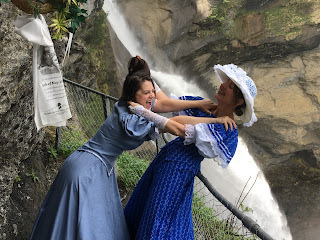
What book would you recommend to other Sherlockians?
An interesting French book which I would recommend is Maximilien Heller by Henry Cauvain. I must give the credit to Takeshi Shimizu from the SHSL who first told me about this book and translated it into Japanese. I don’t know if it was translated into English.
It is a novel published in 1870, so 17 years before STUD.
It is the story of a doctor who meets a strange man called Maximillien Heller. He is tall, thin, lonely, enjoys opium and chemistry, has great capacities of deduction, sometimes uses disguises. And they go solve crime together.
Rings a bell ?
Where do you see Sherlockiana in 5 or 10 years from now?
I believe there is a new generation of Sherlockians that is very capable of maintaining traditions but also creating new ones. With my club we sometimes do animations in public libraries and the children are always very curious and interested in Holmes.
The Sherlockian world will probably evolve, adapt, but I am sure it will still be doing strong !
May 29, 2022
Interesting Interview: Howard Ostrom
If you've read a Sherlockian discussion on Twitter of Facebook, the name of this week's Interesting Interview will be familiar to you! Howard Ostrom is probably the most knowledgeable guy out there when it comes to Sherlockian performers. And when someone has a question about a play, movie, television series, or YouTube video he's often there to help out.
It seems like I've know Howard since I signed on to the Sherlockian Internet, but I really came to appreciate him when he contributed a chapter to The Finest Assorted Collection, where he detailed his transformation from autograph collector to chronicler of performers. His obsession, er I mean passion has collected THOUSANDS of folks who have ventured into the sphere of performers. But now it's time to turn the lens on Howard himself, and see how he enjoys this hobby of ours!
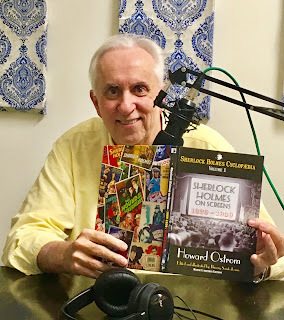
How do you define the word “Sherlockian”.
My definition would be way looser than most others. Simply a Shelockian (or Holmesian) is anyone who enjoys the character or enjoys the author, be it scholarly or has a fan. They can write scholarly papers about him, or simply don a deerstalker, or perhaps more so today cosplay wearing Cumberbatch’s coat and scarf combo, or make a fan video, or be in a legion of zoom, or sing about him, or, design fashions based on him, there is only one requirement for me for being a Sherlockian, they must be good company and always have fun with it.
How did you become a Sherlockian?
I used to answer that question with two responses. I was quite a reader as a young boy, and after reading and liking my older sister’s Nancy Drew books, the local librarian suggested I try the Hardy Boys and/or Sherlock Holmes. I loved Holmes, the Hardy boys not so much. So when my parents got their first TV, the Basil Rathbone/Nigel Bruce films were always on in New York and I was really hooked.
However, now I realize through all the research I’ve done on Sherlock Holmes in the media that a sublime Holmes image may have already been planted in my mind from the many things I actually witnessed him in, even prior to those early occurrences. Learning that the TV shows, cartoons, and comic books I watched and read almost all had a Sherlock Holmes type character in them may be actually where I first came to appreciate the detective.
I can give you many examples, but to keep it short here are just a few examples. Kukla had dressed in a Holmes costume on Kukla, Fran and Ollie (1947-57). Dressed as Sherlock Holmes and forever peering through his magnifying glass, John J. Fadoozle was the self-proclaimed marionette police inspector who protected the fictional town of Doodyville from 1947 - 1954, on the children’s program The Howdy Doody Show. Then of course their were the comic books I had where Holmes would show up in Batman and Superman comics occasionally, or he had the Classics Illustratedversions which I owned, until Mom threw them out when I was away to college. So to cut this answer short, basically I no longer can pinpoint how I became a Sherlockian - just the fact that he was in my world must be the answer.
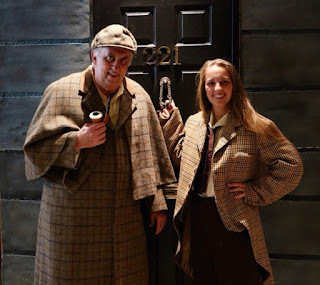
What is your profession and does that affect how you enjoy being a Sherlockian?
My profession has always been in the pari-mutuels industry. It has negatively affected my ability to enjoy being a Sherlockian as it is an industry which required me to work weekends my entire life. This does not not allow me to attend BSI or scion events, which may be why I’ve been under the BSI radar all these years and never been invited to be a member.
What is your favorite canonical story?
Hey or (hay LOL), I’ve been in the pari-mutuel industry my entire life, which involves horse racing. The company I work for now, Ocala Breeders’ Sales, breeds and sells racehorses. My nom on the ‘Hounds of the Internet’ and the ‘Welcomes Holmes’ discussion groups has been Straker since day one. So you tell me what my favorite canonical story is!
Who is a specific Sherlockian that you think others would find interesting?
I’ll name you two if you don’t mind, since both are fantastic Sherlockians that most people don’t know enough of. They are Ray Wilkcockson and Ross K. Foad.

Ray Wilcockson is a retired English teacher living in Morecambe, England who maintains a fantastic blog featuring much on early stage Holmes productions. His blog can be found at: http://altamarkings.blogspot.com It is incredible, and everyone needs to check it out. Ray has co-written papers with me and contributed more entries for me to “The A-Z List of Sherlock Holmes Performers” than perhaps even myself.
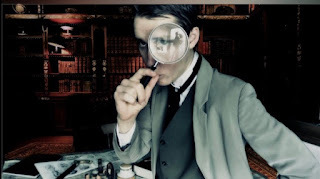
And speaking of “The A-Z List of Sherlock Holmes Performers” it can be found on Ross K. Foad’s No Place Like Holmes website at: https://www.nplh.co.uk along with so many other Sherlockian essays and videos. Ross is a young man from Kingston-on-the-Thames, England, who created the first internet Sherlock Holmes series, filmed entirely from a green screen in a small room in his house. His various internet series are highly entertaining, as are the Diogenes Documentaries he also created for YouTube. You simply must check both these extremely interesting Sherlockians’ links out.
What subset of Sherlockiana really interests you?
I’m really into the Quasi-Holmes productions being created world-wide by the explosion of interest created by the BBC Sherlock Series and the Guy Ritchie Sherlock Holmes films. Especially notable are the incredible new shows being produced in Finland, Russia, S. Korea, Japan and China in the last decade. I’m still working daily on “The A-Z of Sherlock Holmes Performers” which is at 8,017 entries with over 17,000 photos as of the moment I’m answering this question. Also I’m working on expanding my Silent Films database which has over 360 films in, while I doubt you will find a reference book with 100 even.
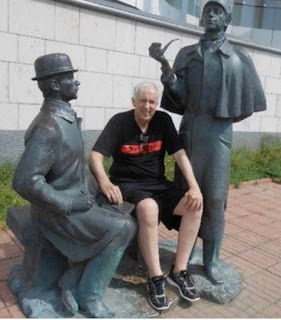
What is it about Sherlockian films and shows that draws you to them so much?
Just watch Basil Rathbone, Jeremy, Brett, Benedict Cumberbatch, Vasily Livanov, Kenneth Macmillan, Yûko Takeuchi, Douglas Wilmer, Christopher Plummer, or Peter Cushing in the role and you will understand why. Holmes is someone we can believe is real, a testament to that is how many people do believe he is real.
I gave a lecture at a small church school for mentally challenged children and their parents recently, and here is an interesting statistic that came from it. To find out how much these children and parents knew about Sherlock Holmes I started out with the question who has heard of Sherlock Holmes? All 11 parents and the 7 children raised their hands. Then I said lower your hand if you think Sherlock Holmes is a real person. 9 of the 11 adults lowered their hands, none of the children did!
Your database of Sherlockian performers is like nothing I've ever seen before. How did it get started?
I started the A-Z database as my own personal cross reference file for the Sherlock Holmes Cyclopedia that Thierry Saint-Joanis and I were discussing at the time. I correspond with Peter Blau daily, and when I mentioned I was starting an A-Z List to him, he stated that was mission impossible and I’d probably regret ever starting it. I love the thought of a mission impossible, and now I’d agree with him that it is impossible for too many reasons to explain here. Still I love all the people I’ve met doing it, and it has been a fun journey. You must check it out at https://www.nplh.co.uk where the first 8,000 entries are posted. If you are reading this interview you just may be in it!
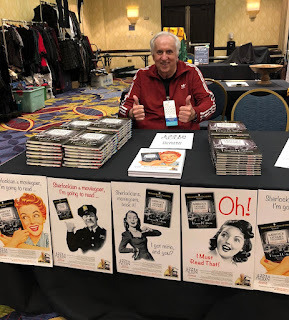
What book would you recommend to other Sherlockians?
When I began collecting books I remember trying to get all Shaw's Top 100 list. With all my moving around the books unfortunately had to go. Yet, today I find it sufficient just having Mattias Bostrom's FromHolmes to Sherlock, David MacGregor's Sherlock Holmes: The Hero with a Thousand Faces, and Les Klinger's Annotated Sherlock Holmes on my shelf, and my own databases (which dwarf anything DeWaal compiled) in files on my computer.
I try to avoid pastiches, just too many out there, but if I think hard the two I enjoyed the most were Ten Years Beyond Baker Street by Cay Van Ash and The Surrogate Assassin by Christopher Leppek.
Where do you see Sherlockiana in 5 or 10 years from now?
Since Sherlock Holmes is the man who never lived and will never die I don’t see it going away. In compiling information for my Holmes on Screens database the amount of entries keeps increasing (mostly due to foreign entries and internet streaming). The year 2018 entries alone I could write a full volume on. It is so large. The number of stage plays keeps increasing largely due to Ken Ludwig’s success.
The large amount of product needed for all the streaming channels these definitely will increase the Holmes productions being looked into. It already has, i.e. Enola Holmes 1 & 2, The Irregulars, The Sniffer, Border Town, Maiden Holmes, Anna the Detective, Massage Tantei Joe, Drama Queen, et al. I could go on and on… The point being I see it growing exponentially larger.



